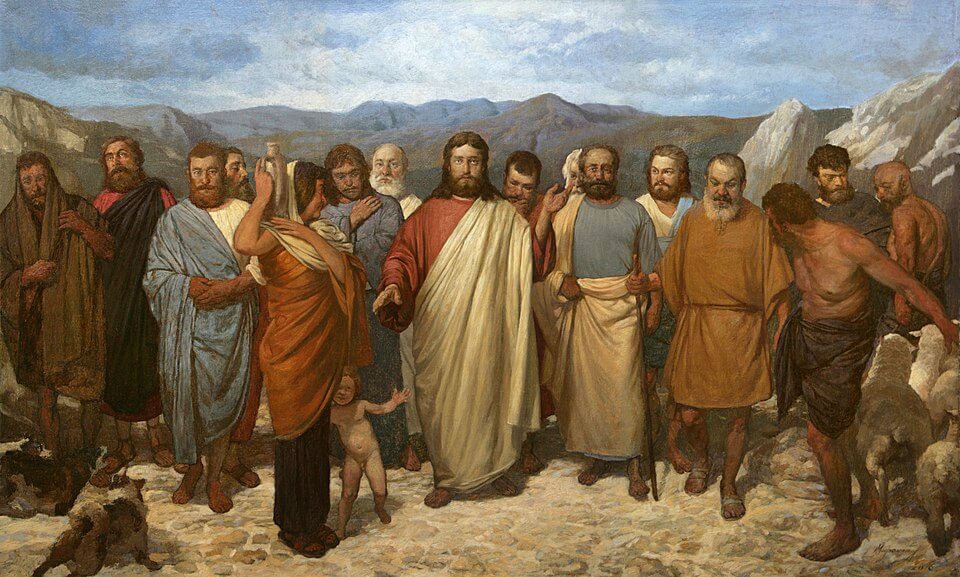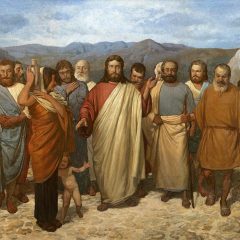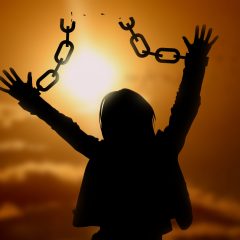free
Are You A Disciple of Jesus?

23rd Sunday Ordinary Time – Year C
Fr. Mark Gatto
Preached: September 7, 2025
Recently I heard someone say, “Going to church doesn’t make you a Christian any more than standing in a garage makes you a car.”
If someone asked you, “are you a disciple of Jesus?” how would you answer? Before answering reflect on what Jesus says in our Gospel today.
Do you hate your father and mother, your spouse and children? Are you carrying your cross? Have you given up all of your possessions?
We just heard Jesus speaking of these things required of his disciples. So, how would you answer, if asked, are you a disciple of Jesus?
There was a famous guru who had a centre full of many thousands people who came to join him. A reporter came to see what this was all about. When he met the guru he said, “there must be 10,000 people here. Do you know how many disciples you have?” The guru responded, “about 3 or 4.” I wonder about our parish, a full church, but how many disciples do we have? I struggle to know if I am truly a disciple of Jesus.
How do we know if we are true disciples of Jesus? The key question is, are you free?
Are you free from the need to be popular? Are you free from the need to be successful? Are you free from the need to be wealthy? Are you free from the need to join the crowd? Are you free enough to lay down your life for others?
Those challenging words of Jesus in the Gospel might disturb us at first, when seen at their surface level. But, what Jesus is actually doing is calling us to be free. Jesus himself was utterly free. He was able to stand up to the assumptions, customs, and cultural norms of his society. He interpreted the laws, especially the Sabbath laws, freely. He was bold enough to disregard all the sacred traditions about what was clean and unclean. He had the personal freedom to do God’s will regardless of what anyone thought or said.
Jesus was free to love, to love the poorest, as well as the rich young man. The pious were scandalized by how he loved the prostitutes, the tax collectors and the lepers.
The radical freedom of Jesus made him fearless in living life. He was not fearful of people in authority, including Herod or Pilate. Jesus was free to die, to give his life for the kingdom. He was not attached to anything or anyone, even to his own life, or the success of his mission.
His freedom came from his great trust in God.
We know that we are disciples of Jesus when we are truly free. When we have let go of our attachments, our need for success, worries about our reputation. When we are able to laugh at our ego. We even experience freedom from guilt for we know ourselves as forgiven. Julian of Norwich would say “All will be well and all manner of things will be well.” She could say this as she was a disciple of Jesus. This freedom is rooted in a fundamental trust in God’s love.
There are many false forms of freedom offered to us in our society. They are rooted in selfishness, self-centeredness, and self-indulgence. There is the false freedom of nations who attack weaker nations because they want the ‘freedom’ to use their power to dominate others.
Jesus was radically free. We know we are disciples of Jesus when we are becoming free. Free to love, free to let go of any attachments which are obstacles to God’s will. Free to give of our life for goodness, love and peace.
So, reflect on that question today. Are you a disciple of Jesus? Are you free as Jesus was free? How do you need to become free?
Remaining Free

3rd Sunday of Lent – Year B
Fr. Mark Gatto
Preached: March 7, 2021
When you think of Catholic morality, what comes to mind for you? Sometimes we think of commandments, rules, laws. We think of someone saying, “do not do this”, “do not do that”. Morality becomes something that restricts our freedom. God becomes a judge controlling our behaviour, God becomes like the commandant of a prison camp.
But, in the Book of Exodus, when the Ten Commandments is presented to the people, God begins by saying, “I am the Lord your God who brought you out of the land of Egypt, out of the house of slavery.” It begins by recalling how God had set the people free. This is the God who is a liberator, who desires that we be truly free. So, the Commandments are not restrictions, not rules to control our behaviour. They are a path that guides us to true freedom. After God has set the people free from slavery in Egypt, this God wants the people to remain free in the deepest sense in their new life.
Catholic morality at its core is meant to be a way and a path to true love and true freedom. God wants you to be and remain free in the truest sense possible. The commandments are guides which lead us to a life that is free, that prevents us from becoming slaves to anything in this life. I will just give a couple examples of how the Commandments lead us away from slavery and into freedom. I will look at the First and Third Commandments.
The First Commandment is “you shall not make for yourself an idol.” You shall have no god besides the one true God. What do we mean by idols? When we make anything in this life an absolute, something in this life becomes all-consuming, more important than anything else. In our society that could be money, drugs, desire for power, or even peer pressure.
Is there anything in your life that has become obsessive, has become more important than God? The problem is that anything in this life that becomes more important than God, that becomes an idol, ends up taking over our life. We become a slave to it. We see that in an obvious way with drug or alcohol addictions.
But, for many of us it is more subtle. Our concern with what others think of us can make us a slave to pleasing others, or to be overly concerned with how we appear to others. Most crimes are committed by people who have made money a god, so they will do anything to get and keep it. Including illegal or unjust actions. Is there anything that has become like a god in your life? God wants you to remain free, not to become slave to anything or anyone in this life.
The Third Commandment is “Remember the Sabbath day and keep it holy.” This Sabbath principle found in the Scriptures is not about some arbitrary rule or law so that God can see that we will obey. The Sabbath principle is a very human need. We need to rest, we need to stop from our daily routines, we need time to reflect. We human beings are not machines. Without sabbath in our lives, we lose sight of what matters, we forget who we are and what is most important.
This is why it is so important to have sabbath time in our life. In our western world, many of us suffer from being workaholics. Sometimes our economic system encourages us to be workaholics. But, God wants us to remain free, to remember who we are and what is ultimately important.
You can go through each of the Ten Commandments and discover how each of them protects us from falling into some form of slavery, guiding us into freedom. Jesus getting upset in the Temple is rooted in God’s desire that we remain free. He is angry at their greed, at their system that excluded the poor. The Temple was meant to be a place where people remember the true God. Instead, they have made idols that hid God or kept the poor away from God.
Our God is a liberator, a God who desires to set us free and that we remain free. Our Catholic morality, at its core, is about freedom. The Commandments are a guide to remaining free. God wants you to be free and to remain free.

